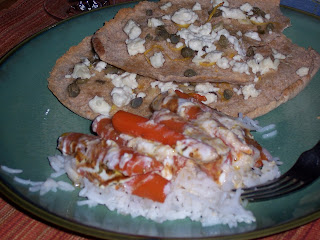
I didn't want to say anything before, for fear of jinxing things, but Monkey really seems to be getting the hang of this eating business.
It happened quite suddenly one afternoon--we were out of her favorite sweet potatoes, so I pulled some carrot puree out of the freezer. I didn't think she'd eat much of it, but I put two cubes in a little bowl anyhow--that's all that was left in the bag and they were sort of wan and smallish, so I figured, what the hey. I added some rice cereal and a little water and--whoa, before I knew it the bowl was empty. Next day she plowed through a full serving of peas (more recently, I swear I've even heard her say "Mmmm" between bites of that previously scorned vegetable), then scarfed down her oatmeal three mornings in a row.
All of this happened within a few days of the emergence of her first two teeth. I suppose that is just coincidence, but the combination makes me feel a little sad that my baby is growing up so fast.
It's sweet in equal measure as bitter, of course, which is why I decided to celebrate Monkey's newfound enthusiasm for food by making one of my favorite carrot recipes for the grownups' dinner earlier this week: a simple recipe for braised carrots topped with yogurt (a friend from the Internets described the basic method to me, calling them "Nigel Slater's Turkish Braised Carrots," though I couldn't find the original recipe online to confirm the source), to which I've added some warm spices as well as extra good things on top. The result is what my mom would call "slickery" (that's a good thing), in a nod to one of my favorite books from childhood.
Usually we have these carrots as a side dish, but I figured they could pass as a main if served over rice. Come to think of it, carrots with rice (cereal) and yogurt was what Monkey had for dinner one evening recently before sleeping through the night--7 hours anyway, which apparently counts if you're a baby--for the first time in months. I know the supposed link between solid foods and sleep is all a big myth, but hey, I'll throw a little party for that particular correlation-without-causation any day.
*****
Turkish-ish Braised Carrots
(Quite possibly adapted from Nigel Slater)
8 medium carrots
1 T butter
2 tsp olive oil
1/4 C water
1/4 tsp ground ginger
1/4 tsp ground coriander seed
pinch of salt
about 1/4 C full-fat plain yogurt
1 tsp zahtar
2 tsp pomegranate molasses
Peel the carrots and cut them in large chunks (I cut them in half crosswise, then slice the fat end in half lengthwise).
In a medium saucepan over low heat, melt the butter and olive oil together. Add the spices and stir to distribute. Add the carrots and water, and stir to coat the carrots with the fat. Turn the heat up to low-medium and cook, covered, until the carrots are tender, about 15-20 minutes. Stir things up now and again, but don't be afraid if the carrots get some brown, caramelized spots on them--that's where the deliciousness lives. Well, there and in the next step:
Place the carrots in a serving bowl and spoon the yogurt over top, sprinkle with zahtar, and drizzle with pomegranate molasses.
Serves 2 as a main dish over rice, more as a side dish or mezze.
*****
The Mr. and I rounded out our plates with a kind of olive oil-based pizza made with pita bread. Now, I'm aware that bestrewing some store-bought pita loaves with toppings hardly counts as cooking, but I'm including the recipe anyhow because I'm charmed by the sort of intellectual stone-soup process by which it came about: I had a brainstorm about using up the leftover feta in the fridge, and somehow when it occurred to me to add some lemon zest the capers came tagging along behind; the Mr. suggested adding garlic to the olive oil and was also responsible for buying the whole wheat pita bread (I would surely have chosen white, but the whole wheat variety is much better for this recipe, the nuttiness playing off the tangy cheese).
Also, I'm including the recipe because these are so, so simple, and freaking delicious.
*****
Flatbreads with Feta
2 T olive oil
2 medium (or 1 large) cloves garlic, sliced crosswise very thin
2 loaves whole wheat pita bread
2--hmm, no, make that more like 3-ish--ounces crumbled feta cheese
zest of 1/2 lemon
2 tsp capers, roughly chopped
Place the olive oil in a small bowl, add the sliced garlic, and let sit for a half hour or so.
Preheat oven to 425 F. Split each pita loaf into two rounds and place the rounds, insides (rough sides) facing up, on a pizza pan or baking sheet. Brush the bread rounds with the oil and distribute the garlic evenly over the four pieces. Then top with the feta, lemon zest, and capers. Bake for 5-7 minutes, or until the edges of the bread get slightly brown and crispy.
Serves 2
*****
Finally, I wanted to compile a little list of carrot baby food recipes to leave you with, but yikes, there is just not that much out there. Just a bunch of sites that tell you to peel some carrots, steam them, and then puree them. Yeah, thanks. And also--wow, so boring! In my mind I am clamping my mouth shut, turning my head resolutely to one side, and banging my hands impatiently on my highchair tray.
But here are a couple of recipes that I thought could be adapted--or at least serve as inspiration, in their combinations of flavors--for feeding little ones:
Carrot and Cardamom Mash (Ambrosia and Nectar)
Roasted Carrot and White Bean Dip (Cook Like Mad)
Do you have a story about your baby suddenly becoming enthusiastic about food? Or was it a more gradual process in your house?





